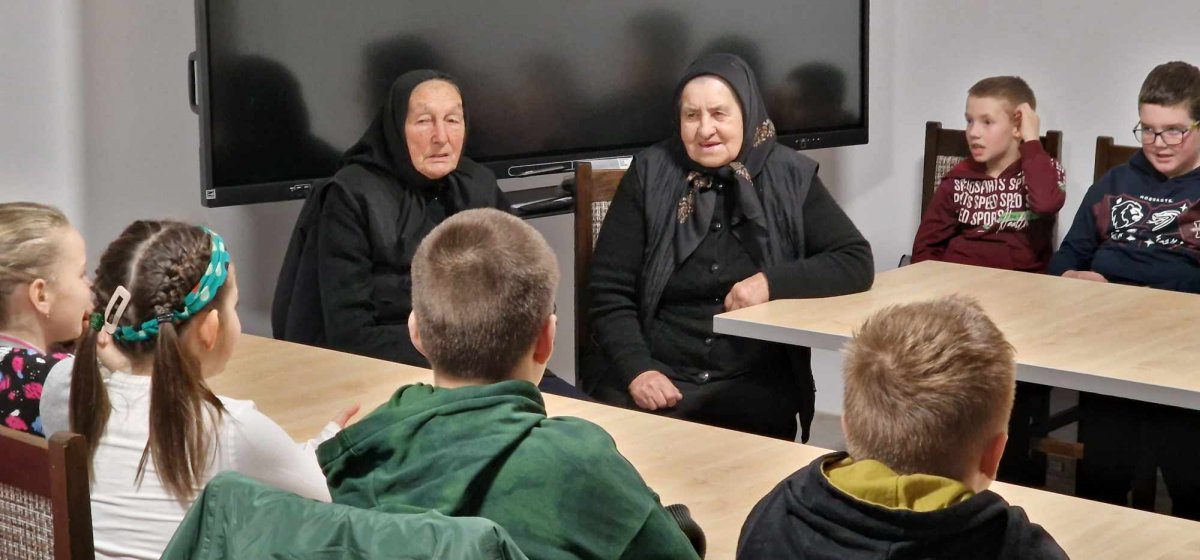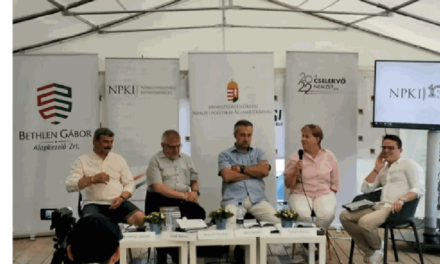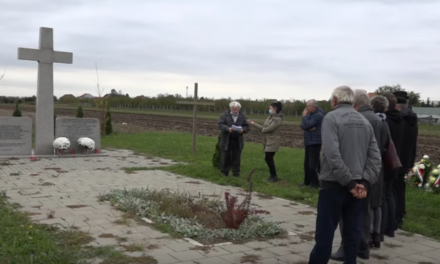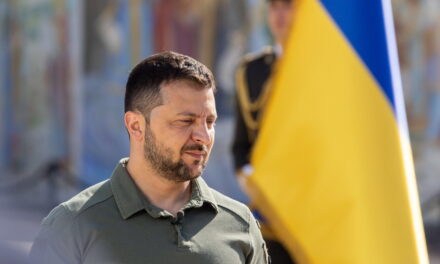Elderly local women who have been awarded the Master of Folk Art award teach the children the Mezőg folk song treasure in Búza, Cluj County. The initiative was born in the framework of a movement called Tündérkert, which also aims to reteach folk culture and strengthen Hungarian scattered communities.
kronikaonline.hu visited the rural settlement 30 kilometers from Szamosújvár , where Anna Takácsné Czeghér and Piroska Takácsné Szász - holders of the title of Master of Folk Art - talked with senior singers, Reformed pastor István J. Kovács and the children about the initiative and life in Búza.
As a new phase of the movement called Tündérkert, which aims to re-teach folk culture and strengthen Hungarian scattered communities, the youth of the Búza village in Cluj County are taught the Mezős folk song treasure.
The initiative fits into the Tündérkert movement, which started last fall in Búza thanks to István Török, the manager of the Spectrum Theater in Marosvásárhely, the Hungarian actor József Szarvas and Zsolt Bogdán, the artist of the Cluj-Napoca State Hungarian Theater. Of course, the movement was embraced by István J. Kovács, the pastor of the Búzai Református Egházközség: on the second Sunday of November, 12 trees were planted, each of the Búza children confirmed in the last three years received a sapling, which they will take care of.
In the future, as many saplings will be planted as the number of people who confirm each year, however, the series of actions to strengthen the scattered community is not exhausted by planting trees, which is why education aimed at the live transmission of folk culture and knowledge has also started in Búza.
Zsolt Bogdán is, so to speak, a "newcomer" in the village, where he bought a house a few years ago, and since then he has been actively involved in the life of the community. He encouraged the teaching of folk songs from the "living source", in the most natural way, within the framework of the Tündérkert movement: the teaching began in mid-February and takes place on weekends, when István J. Kovács teaches the younger children attending religious classes and the older children preparing for confirmation in the parish building . Beautiful singing women who have been awarded the title of Master of Folk Art come here, who sing with the children and young people at the end of the religious class. The pastor told the approximately 25 young people at the first folk song lesson on February 10: it is very important that they do the beautiful and good things that their grandparents and great-grandparents did.
This is actually the tradition that what is beautiful is worth preserving and learning, and Aunt Anna and Aunt Piroska will help you with this, and the idea is from Zsolt Bogdán," emphasized the pastor.
The newspaper also asked István J. Kovács, who has served in Búza for seven years, about the life of the village, the Reformed community, and the demographic movements of the village. As he said
due to the years of the epidemic, the number of people going to church has decreased, and the number of local young people is also decreasing.
"Many of them go to school in Szamosújvár and Cluj, so it is difficult to recruit them. There is a Hungarian school in the village from the first to the eighth grade, after which the young people go to study. However, they are very clever and helpful, when we organize summer camps, for example, up to twenty young people help me" , reported the pastor.
He also talked about the fact that more people came to the folk song lesson than to the religion class on weekends, because
Zsolt Bogdán went to the school and invited each child separately.
By the way, the village currently has about 1,100 inhabitants, the number of Reformed people is 430, about the same number of Orthodox, the rest of the inhabitants are Adventists and Pentecostals. "I have been serving here for more than seven years, then the number of Reformed people was 504, so in seven years we have decreased by more than seventy. But we don't want to be pessimistic based on this math, as encouraging trends are emerging: there are young families who see the fantasy of staying here and prospering here, since so far most of them have gone to big cities and abroad," explained the pastor.
He added,
the young people who stay in Büza are entrepreneurs. Some operate a car repair shop, others make cheese, some grow fruit, some keep bees or press oil, keep animals after winning tenders, grow vegetables, run a construction company, and there are already three boarding houses in the village - so typical at them for being hardworking and trying to make a living here.
"There are 47 mother churches operating in the Reformed Diocese of Dési, and we can speak of about 100 Reformed communities with their affiliated daughter churches and scattered congregations. I have been through them three times in the last 10 years, and I have seen that the situation is much sadder in many places. In this part of Mezóség, in the area of attraction of Szamosújvár, there are one or two larger islands, in addition to many small communities, where the situation is slightly more encouraging from the point of view of the Hungarians and the Reformed: Szék, Ördöngösfüzes and Búza can also be classified here. "Communities are shrinking everywhere, but in the mentioned places we still have good hope for the middle-aged and for those among the young who stay at home", emphasized the pastor of Búza.
István J. Kovács pointed out that
where the school ceases to exist, there is a very large drop in the number of people - in such places the Hungarianness dwindles, and young people see no fantasy in staying there. He added that they are also trying to strengthen these "islands" at the church level.
"Last year, I told the congregations in Melegföldvár, Ketelak, Military, Magyarborzáz, and Kékes to hold the Vacation Bible Week for children together, which has been organized for two decades by KOEN (Foundation for Christian Education and Moral Education). Here in Búza, I think there are 20-25 children, and they are 2-3, and then it's really good when the children from the neighborhood can get to know each other and make connections. And it worked out very well, so we are trying to strengthen cooperation at the field level as well," explained the pastor. By the way, István J. Kovács gives religious lessons to the children in a very experiential, interactive and interesting way.
It makes the children think together, moves and activates them. "I graduated from theology thirty years ago, and since then I have been convinced that the religion class should not primarily be about imparting knowledge. It should not be about the priest reciting the text, the children listening to it and then having to repeat it, but
first of all, you have to find the voice with them, make the children feel good in class, be direct with each other. If this is present, the approach to religion can be based on this," says István J. Kovács.
Honored with the title of Master of Folk Art, the women in black headscarves and black dresses are elderly, but their voices and singing voices exude strength and serenity. Among other things, the children were taught the folk song from Búza: "I climbed up on the stove, the edge of my skirt burned, edge, edge, edge of my skirt, my master beats me for the evening". But they also had the children practice the harder-to-learn melodic song, the lyrics of which go like this: "In the forest, in the forest, in the beautiful round forest, my baby is picking strawberries in her pink apron. Take it, baby, take it, so that it doesn't wither, so that our love doesn't break in half".
When reading the text, Aunt Anna adds: "Love is always a secret, isn't it?"
Aunt Anna and Aunt Piroska were also asked how they see the essence of the education that is now starting. "We think that young people need this treasure so that the old folk tradition is not lost. We are very happy that we can still come here at the age of 85. We taught the children before, but not regularly, we also went to the school to teach them," said Aunt Anna. Both of them recalled that in their childhood and youth, learning folk songs came naturally, there was no need to organize special education, since in the many entertainments, the songs could be learned from both the old and the young.
"Nowadays, these songs are not played at weddings either. We still learned these musics, songs, listeners,
we used to call home entertainment "vergel", from the Romanian word (the Romanian term vergel means traditional folk entertainment, that's when young people got to know each other to find a partner - ed. note). This was held in autumn, we ate stuffed cabbage at this time, we learned the songs there, but of course also from our parents," said the women.
Aunt Anna said
it's sad that the youth from Búza are also scattered, he just had a great-grandchild in Belgium, his grandchildren live in Hungary, only one of them lives in Szamosújvár.
"Unfortunately, there is no one here to organize balls. There used to be spinners, many lived here in one family, there were three or four daughters-in-law, today the situation is different. But we consider passing on folk songs to children and young people a matter of our hearts," said Aunt Anna and Aunt Piroska.
The full article can be read HERE
Cover photo: Piroska Takácsné Szász and Anna Takácsné Czeghér teach the children folk songs from the Mezőg • Photo: kronika.ro / Judit Kiss













